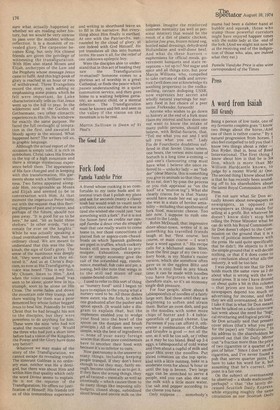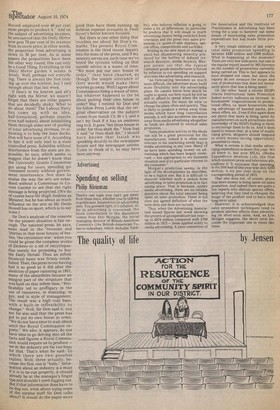A word from Isaiah
Bill Grundy
Being a person of low taste, one of my favourite couplets goes "I know two things about the horse,/And one of them is rather coarse," By a natural progression from horses, I also feel compelled to tell you that! know two things about a rider — Don Ryder, that is, boss of Reed International. The first thing I know about him is that he is Sir Don, which is more than Mr William Hardeastle knows, to judge by a recent World At One. The second thing I know about him is that he has recently been sounding off to his shareholders about the latest Royal Commission on the Press.
I'm not sure what Sir Don actually knows about newspapers as newspapers, as opposed to newspapers as things made for selling at a profit. But whatever he doesn't know didn't stop him telling the Prime Minister what he can do with his Royal Commission. Sir Don doesn't object to the Commission on the ground that it is a form of political interference with the press. He said quite specifically that he didn't. He objects to it on the simple ground that it will decide nothing, or that if it does come to any conclusion about what ails the industry, it will be too late.
I was pleased to see that Sir Don holds much the same view as I do about what is wrong with the national press. It is one I have droned on about quite a bit in this column — that prices are too low, that newspapers depend too much on advertising for income, and that they are still overmanned. At least, I take it that is what Sir Don meant when he talked on a radio intervieW last week about the need for "log1,-, cal structuring and logical pricing. Sir Don actually said that present cover prices (that's what you paY for the paper) are "ridiculous." In his address to the shareholders he pointed out that the Daily Mirror cost "a fraction more than the price of two cigarettes or a quarter of a pint of bitter." Since I don't smoke cigarettes, and I've never found ,a pub that serves quarter pints, I II have to take his word for it, but assuming that he's correct, the point is a fair one. On the subject of overmanning he observed a shade maliciouslY, perhaps? — that "the lately deceased Scottish Daily Express, while enjoying roughly the sarre circulation as our Scottish Daily Record, employed over 40 per cent more people to produce it." And on the subject of advertising incomes, he announced that the Daily Mirror now gets 70 per cent of its revenue from its cover price; in other words, the proportion from advertising is down to 30 per cent. As in some papers the proportions have been the other way round, this can only be a Good Thing. Everything in the Daily Mirror garden it seems, is lovely. Well, perhaps not everything. There is always the Sun coming up over the horizon, but I said enough about that last week.
If Don's in his heaven and all's right with the Mirror, we mustn't forget that there are other papers that are decidedly shaky. What to do about them? The Labour Party has come up with an idea, half-formulated, perhaps (maybe even half-baked), about subsidising them through some sort of pooling of total advertising revenue, re-allocating it to help the lame ducks. Don will have none of it. According to him it will only lead to a state controlled press. Subsidies without interference from the state are impossible, he says, which seems to suggest that he doesn't know that the University Grants Committee got along for years, spending government money without government interference. Nor does he realise the way the arts are subsidised without a Commissar in Covent Garden to see that the right message is being projected. (We do of course have Mr Hugh Jenkins as Minister, but he has about as much influence on the arts as Mr Denis Howell has on sport, which is to say none.) . Sir Don's analysis of the reasons for the present situation is fair enough. The national press, he says, went mad in the 'twenties and 'thirties in that most lunatic of battles, 'the circulation war,' when you could be given the complete works of Dickens or a set of encyclopaedias merely for promising to buy the Daily Herald. Thus an infirm financial basis was firmly established. Then, the press never having had it so good as it did after the abolition of paper rationing in 1951, many of the absurdities became an integral part of the structure that was built on that infirm base. "Profitability led to profligacy in the use of resources, in manning, in Pay, and in style of management. The result was a high cost base, With a built-in inflexibility to change." Well, Sir Don said it, not me, He also said that the press has got to put its own house in order.
"We do not have time to wait about until the Royal Commission re Ports." We also, it appears, do not have time to go delving into all the facts and figures a Royal Commis sion would require us to produce — We in the industry are far too busy for that. That's what he said. To Which there are two possible replies. Well, three actually, because the first one is "balls." Infor mation about an industry is a must if it is to be run properly, it should already be at the manager's finger tips and shouldn't need digging out. But if that information does have to be dug out, what about using some of the surplus staff Sir Don talks about? It would do the paper more good than have them running up dubious expense accounts in Fleet Street's better known boozers.
But there is one other thing that troubles me about Sir Don's remarks. The present Royal Commission is the third recent inquiry into the state of the press, and if my memory serves me, each time we've heard the tycoons telling us that outside advice is a waste of time. "We must put our own house in order," they have chanted, as though the simple utterance of their words would make their worries go away. Well I agree about Commissions being a waste ortime, but whatever happened to the bit about putting their own house in order? May I remind Sir Don and his fellow Press Lords that the original observation on the subject comes from Isaiah Ch 38 v I, and it isn't my fault if it has an ominous ring to it. It goes "Set thine house in order: for thou shalt die." Now had it said "or thou shalt die," 1 should have known that Isaiah was speaking directly to the newspaper bosses and the newspaper unions. Come to think of it, he may have been anyway.

































 Previous page
Previous page